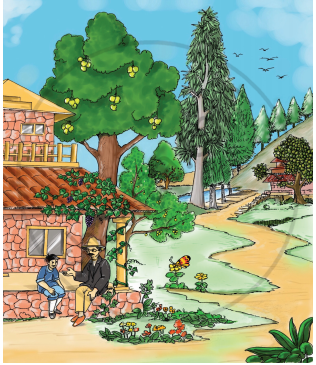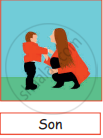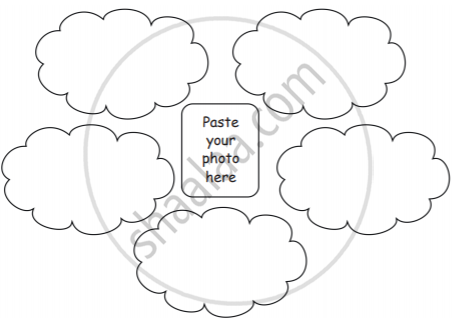Advertisements
Advertisements
प्रश्न
Go through the poem and state whether the following statement is true or false.
Planners make their plans mathematically perfect, at the same time they calculate their profit.
विकल्प
True
False
उत्तर
Planners make their plans mathematically perfect, at the same time they calculate their profit - True.
APPEARS IN
संबंधित प्रश्न
To what end have humans used their superior intelligence ?
Dolly Winthrop has a very noble nature. Comment.
Would you agree that the author’s grandmother was a person strong in character? If yes, give instances that show this.
Identify the phrases and lines that indicate distance between father and son.
'Have you come back?' said the woman.'I thought that no one had come back.'
Does this statement give some clue about the story? If yes, what is it?
Indian society has moved a long way from the way the marriage is arranged in the story. Discuss.
How does the insertion of dialogue in the story contribute to its interest?
Discuss the following in pairs or in groups of four:
Because India's tribal communities are basically bilingual there is a danger of dismissing their languages as dialects of India's major tongues.
Make a list of the preparations made for an assault on Tiger Hill.
Individual guns ___________.
The ______ bees make honey from nectar.
What do fairy-tale witches do?
Discuss in groups and think about it.
Mention three occasions on which you have made someone else angry. What made that person angry? Can you avoid such things in the future?
Answer the following question in one sentence.
What examples of man’s progress have been given in the poem?
Present any one of the speeches given above.
Rewrite the poem in the form of a prose passage.
Portia had many brothers and sisters.
Guess the meaning of the following from the context.
The meadow is wrapped in shadow.
What characteristics of Mr. Nobody do we learn about from this poem?
Start a collection of new and interesting words. Write the words in colored ink on cards of equal size and arrange them in alphabetical order. Try to use the words in your writing or conversation from time to time.
Form groups. Discuss the first two paragraphs. Try to present their content in the form of a series of conversations among the volunteers and the villagers.
Correct the following sentence using facts from the passage.
The great heroes avoided one another.
Who said the following, to whom, and when?
"Ah no, to thee I sing: he sings to God.”
Read the poem and answer the following.
Which strawberries are plump and juicy?
Name the following.
Not comfortable with the wet ground.
Name the following.
Captain of the Indian Team.
Guess the meaning of the following word in the poem.
lined
Guess the meaning of weary.
What is the world wide web?
What is meant by being ‘offline’?
Miranda was brought to the island ____________ years ago.
What did the Bodwells think when they heard the mother shout.
Who is wise according to you?
Who am I?
Who Am I? is a guessing game where players use ‘yes’ or ‘no’ questions to guess the identity of a famous person. Questions are based upon the traits and characteristics of a person everyone will be able to identify.
Divide the class into groups. One group should decide the personality while the other group should ask ‘yes’ or ‘no’ type questions. To win the game, a team needs to find out the person within 10 clues.
Sample questions to ask. Answers must be ‘yes’ or ‘no’ only
- Are you a male (female)?
- Are you a famous personality?
- Are you a singer (dancer, actor)?
- Are you a historical figure?
- Are you young (old)?
- Are you alive now?
- Does your name start with ‘___’?
- Is he/she ____ ?
Read the following line from the poem and answer the question given below.
| And so it were wisest to keep our feet From wandering into Complaining Street; |
- What is the wisest thing that the poet suggests?
- What does the phrase ‘to keep our feet from wandering’ refer to?
From the poem ‘The Grumble Family’ what kind of behavior does the poet want the readers to possess?
Teach me to appreciate ______.
- nature
- destruction
- small creatures
Have you ever had a strange dream? Share your dream in the class.
Listen to your teacher read the first part of the story. Many things described in the story can be seen in the picture. Find and name them.

What did Raj buy?
Mother did not ask for______.
Why did Muthu say that he could walk along its side?
What made the trip a memorable one?
Geetha madam couldn’t stop the children running out of the train because they ______.
When did the battle of Nauranang start? How long did it continue?
Did Tabaqui receive a warm welcome from the pack of wolves? How do you know?
Vicky’s father decided to change his son’s character.
Choose the odd one out.
Write the homophone for the given word and draw the picture.


Whose hospitality is described in the poem?
Why did Robinson name the tribe Friday?
______ over heard her father’s talking on the phone about the robbery.
Will you solve a mystery with friends? Why?
List out the questions to which you seek answer using 'Why?'

The villagers took oath not to harm the _______.
What makes him fall?
The brush ______ to her will.
Do we worry when the progress is slow?
Replace the bold word/words with a word from the quiver and re-write the sentence –
The teacher said something about his good handwriting. He felt very happy.
What happens when the day is over?
Read the following passage and answer the questions that follow:
The Stationmaster’s Supreme Sacrifice by Sanchari Pal (Adapted)
- Thirty-three years ago, on the night of December 2, 1984, Bhopal was hit by a catastrophe that had no parallel in the world’s industrial history. An accident at the Union Carbide pesticide plant in Bhopal had released almost 30 tons of a highly toxic gas called methyl isocyanate, turning the city into a vast gas chamber. The result was a nightmare; more than 600,000 people were exposed to the deadly gas cloud that left thousands dead and many more breathless, blind and in agonizing pain. Few people know that during the Bhopal gas tragedy a heroic stationmaster risked his own life to save others.
- On the evening of December 3, 1984, Ghulam Dastagir was settling down in his office to complete some pending paperwork. This work kept him in his office till 1am in the night, when he emerged to check the arrival of the Gorakhpur Mumbai Express. As he stepped on to the platform, the deputy stationmaster felt his eyes burn and a queer itching sensation in his throat. He did not know that poisonous fumes leaking from Union Carbide’s pesticide factory were stealthily enveloping the railway station.
- Beginning to choke, Dastagir did not know then that twenty-three of his railway colleagues, including his boss, station superintendent Harish Dhurve, had already died. It was later reported that Dhurve had heard about the deadly gas and had immediately tried stopping the movement of trains passing through Bhopal before collapsing in his office chamber. His suddenly worsening health and years of experience told Dastagir that something was very wrong. Though he did not fully comprehend what was happening, he decided to act immediately when he did not get any response from the station master. He alerted the senior staff at nearby stations, like Vidisha and Itarsi, to suspend all train traffic to Bhopal.
- However, the jam-packed GorakhpurKanpur Express was already standing at the platform and its departure time was 20 minutes away. Listening to his gut instinct, Dastagir summoned his staff and told them to immediately clear the train for departure. When they asked if they should wait until the order to do so came from the head office, Dastagir replied that he would take complete responsibility for the train’s early departure. He wanted to ensure that the train left immediately, without any delay. His colleagues later recalled that Dastagir could barely stand and breathe as he spoke to them. Breaking all rules and without taking permission from anyone, he and his brave staff personally flagged off the train.
- But Dastagir’s work was not done. The railway station was filling up with people, desperate to flee the fumes. Some were gasping, others were vomiting, and most were weeping. Dastagir chose to remain on duty, running from one platform to another, attending, helping and consoling victims. He also sent an SOS to all the nearby railway offices, asking for immediate medical help. As a result, four ambulances with paramedics and railway doctors arrived at the station. It was winter and the gas was staying low to the ground, a thick haze poisoning everything in its path. Besieged by hordes of suffering people, the station soon resembled the emergency room of a large hospital. Dastagir stayed at the station, steadfastly doing his duty, knowing that his family was out there in the ill-fated city. That day all he had for his protection was a wet handkerchief on his mouth.
- Ghulam Dastagir’s devotion to duty saved the lives of hundreds of people. However, the catastrophe didn’t leave him unscathed. One of his sons died on the night of the tragedy and another developed a lifelong skin infection. Dastagir himself spent his last 19 years shuttling in and out of hospitals; he developed a painful growth in the throat due to prolonged exposure to toxic fumes. When he passed away in 2003, his death certificate mentioned that he was suffering from diseases caused as a direct result of exposure to MIC (Methyl Isocyanate) gas. A memorial has been built at platform No.1 to pay tribute to those who sacrificed their lives in the line of duty on the fateful night of December 3, 1984. However, Ghulam Dastagir, who died later, is not one of them. A forgotten hero whose sense of duty and commitment saved countless lives, Dastagir’s story deserves to be recognized and remembered by our fellow countrymen.
- Why was the accident at Union Carbide unparalleled in the world’s industrial history?
- How was Dastagir affected by the poisonous gas?
- What was the action taken by the station superintendent?
- How did Dastagir and his staff break rules?
- What was the cause of Dastagir’s death?
- Find words from the passage which mean the opposite of the following.
- safeguard (para 1)
- common or familiar (para 2)
- prompt (para 4)
- cause (para 6)
